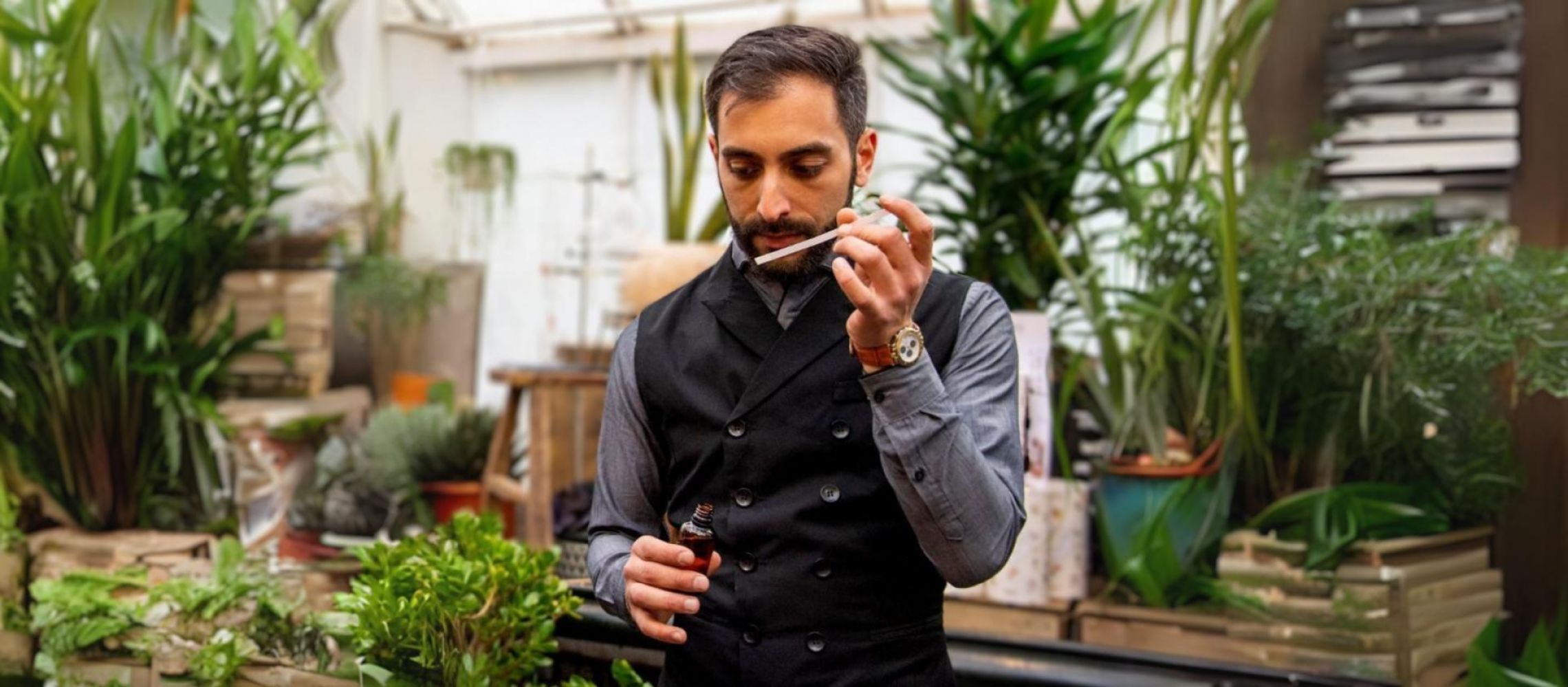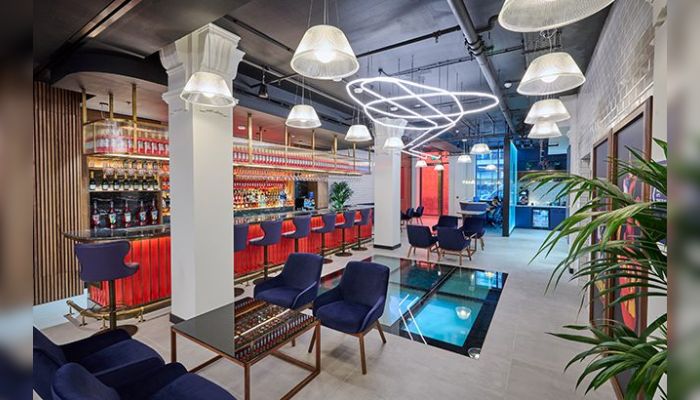Submission Deadline
28 February 2026
Judging
Date
24 & 25 March 2026
Winners Announcement
22 April 2026
28 February 2026
24 & 25 March 2026
22 April 2026

Keivan Nemati is an accomplished industry professional with over a decade of experience in hospitality. He began his career in London cocktail bars in 2009, swiftly moving into management roles. Notably, he worked at the Zetter Townhouse from 2014 to 2017, where he helped establish the venue as one of the world’s best hotel bars.
In 2015, Keivan expanded his expertise by collaborating with the Drink Factory, blending perfume and cocktail techniques. He pursued formal studies in Perfumery Art at the Perfumery Art School UK, completing the course in 2020. Keivan co-wrote the acclaimed cocktail book ‘Make Something Bloody Marvellous,’ shortlisted at the Gourmand Food Awards 2020. Since 2018, Keivan has freelanced with spirit brands, focusing on product development, brand training, and creative events. He now brings his extensive knowledge and innovative approach to his role as Brand Ambassador for Campari Group.
Here's the full interview with Keivan Nemati.
Campari Group

Source: Campari Group - Headquarters in London.
Like many young Italians moving abroad, I initially had no clear career path and started working in bars because it seemed like a fun environment. However, I quickly realized that bartending was much more than just making drinks. The artistry of mixing flavors, the precision in crafting the perfect cocktail, and the ability to connect with customers deeply fascinated me. Over time, I became passionate about mastering the craft, and bartending evolved from just a job to a true vocation, allowing me to express my creativity and passion.
I received most of my training in-house from the bars where I worked, learning on the job and absorbing knowledge from experienced colleagues. To further my education, I completed the Wine & Spirit Education Trust (WSET) program, achieving Level 3
Empathy and Active Listening: Understanding and anticipating customers' needs is crucial. A great bartender listens attentively, shows genuine interest in conversations, and creates a welcoming atmosphere, making every patron feel valued and heard.
Adaptability and Problem-Solving: The bar environment is dynamic, and challenges can arise unexpectedly. A skilled bartender remains calm under pressure, thinks on their feet, and adapts quickly to ensure smooth service and a positive experience for all guests.
Interpersonal Communication: Building rapport with customers and colleagues is essential. Effective communication helps in creating a friendly environment, managing conflicts gracefully, and ensuring clear teamwork, all contributing to a seamless bar operation.
- Concept Fit: The product must align with the overall concept and atmosphere of the venue, enhancing the customer experience and maintaining brand consistency.
- Taste Quality: It's crucial that the product tastes excellent. High-quality taste ensures customer satisfaction and reflects the standards we uphold.
- Pride in Use: I consider whether I would be proud to work with the product. This means it should meet my personal and professional standards, contributing to the venue's reputation and my own satisfaction as a professional.
I stay updated with the latest trends and techniques in mixology primarily through the internet. I regularly read bar magazines and industry publications, follow influential mixologists and bartenders on social media, and participate in online forums and communities
My process for creating a new cocktail usually starts with a brief or clear direction in mind. It's essential to have a clear idea of what I want to make and how the drink is meant to be experienced. This vision guides my selection of ingredients, flavors, and presentation. Inspiration often comes from seasonal ingredients, classic cocktails, or even personal experiences, allowing me to craft a unique and memorable drink.
Currently, I'm experimenting with innovative techniques and ingredients such as resins, gums, and musky-earthy elements. These unique components add depth and an unusual note to my drinks, creating complex and intriguing flavor profiles
In today's highly connected society, it's difficult to pinpoint specific trends in the UK drinks industry, as ideas and techniques are widely accessible and everyone is constantly pushing the limits to impress. Rather than focusing on trends per se, an approach that remains consistently relevant is minimalism—embracing the "less is more" philosophy. This approach emphasizes quality over quantity, allowing the true essence of each ingredient to shine through and creating a more refined and impactful drinking experience.
The cocktail scene in the UK has faced significant challenges over the past few years. With the impacts of Brexit and the COVID-19 pandemic, the number of skilled individuals in the industry has decreased, leading to a decline in service standards. Many experienced bartenders and servers left the industry, and the disruptions have made it difficult to maintain the high levels of quality and innovation that once defined the UK cocktail scene. While there are still pockets of excellence, overall, the industry has struggled to regain its previous momentum.
While I welcome the growing popularity of non-alcoholic spirits and low-ABV cocktails and appreciate the ethos they represent, I often find that these products lack the soul and heritage that traditional spirits possess. It seems like all they have to say is: "I taste like gin but I'm not gin," which can feel inauthentic. From a bartender's point of view, these products are not necessary to create a successful non-alcoholic beverage list. Additionally, they tend to be pricey and, at worst, can confuse consumers with misleading marketing. Crafting excellent non-alcoholic drinks can be achieved without relying on these substitutes by focusing on quality ingredients and innovative techniques.
Low abv cocktail = big fan!
[[relatedPurchasesItems-63]]
Handling difficult or unruly customers requires a calm and composed approach. First, I listen to their concerns and try to understand the root of their frustration. I remain patient and polite, addressing their issues with empathy and professionalism. If the situation escalates, I involve a manager or follow the establishment's protocol to ensure everyone's safety and comfort. Additionally, I believe bar owners and management should organize regular training for staff to effectively handle such situations. The goal is always to resolve the situation amicably and maintain a positive atmosphere for all patrons.
Although I no longer work behind bars, I always strive to lead a sustainable lifestyle. When it comes to sustainability in the bar industry, it's important to recognize that the end-user, such as the bar itself, has a limited impact on the larger issues of sustainability. The significant challenges begin with the production process, where spirit brands and the industry as a whole are notoriously unsustainable. For example, the production of spirits involves high water usage and energy consumption and often results in substantial carbon emissions.
While bartenders can adopt eco-friendly practices like reducing waste, using locally sourced ingredients, and recycling, the broader impact on sustainability requires systemic changes at the production level. Encouraging brands to adopt more sustainable practices, such as using renewable energy, reducing water usage, and opting for eco-friendly packaging, can make a more significant difference in the long run.
By focusing on these larger industry practices, we can work towards a more sustainable future for the entire supply chain, from production to the end-user.
One memorable customer story involves an American woman who claimed she didn't like whiskey. We offered her a nice and smooth entry-level bourbon, explaining that it could serve as an introduction to the category and help her slowly adapt her palate to the acquired taste of whiskey. Two years later, she visited London again and walked into our bar specifically to tell us that now, all she drank was whiskey! It was incredibly rewarding to see how our guidance had transformed her preferences and helped her discover a new passion.
One of the biggest challenges in managing a bar is maintaining staff motivation, morale, and mental welfare. Balancing these aspects is an ongoing struggle, and I'm still exploring the best approaches to address them. I used to have long one-on-one chats with my team daily to understand their needs and concerns better. However, it's a never-ending challenge that requires constant adaptation. The approach always needs to be tailored to the individuals, what the business offers, and the specific circumstances we face. Creating a supportive and understanding environment remains a top priority, but it's an evolving process that demands flexibility and attentiveness.
In the next five years, I hope to see the role of bartenders evolve more towards service and hospitality. While mixology and drink creation are important, the essence of bartending lies in creating memorable experiences for guests through exceptional service, personalized interactions, and a welcoming atmosphere. Emphasizing these aspects will help reinforce the bartender's role as a key player in delivering outstanding hospitality.
If I could only use five ingredients behind the bar, they would be:
- Good-quality Quality Spirits: The foundation of any great cocktail, high-quality spirits ensure that the drink has a solid and enjoyable base.
- Sugar Syrup: Essential for adding sweetness and balancing the flavors in many cocktails.
- Citrus Juice: Fresh citrus juice, like lemon or lime, is crucial for adding acidity and brightness, enhancing the overall flavor profile.
- Sodas: Versatile mixers that can add carbonation and variety to drinks, making them more refreshing.
- Bitters: A small but powerful ingredient that adds complexity and depth to cocktails, enhancing the overall taste.
These ingredients are versatile and fundamental, allowing for the creation of a wide range of classic and contemporary cocktails.
My advice for someone looking to start a career in bartending is to watch your ego, stay humble, and remain hungry for knowledge. Be aware that great things can be built upon hospitality, but remember that success is never achieved overnight. Dedication, continuous learning, and a genuine passion for service are key to building a successful career in this industry.
Show your spirits where it matters. Get your products tasted by top bartenders, buyers and experts at the London Competitions — enter now.